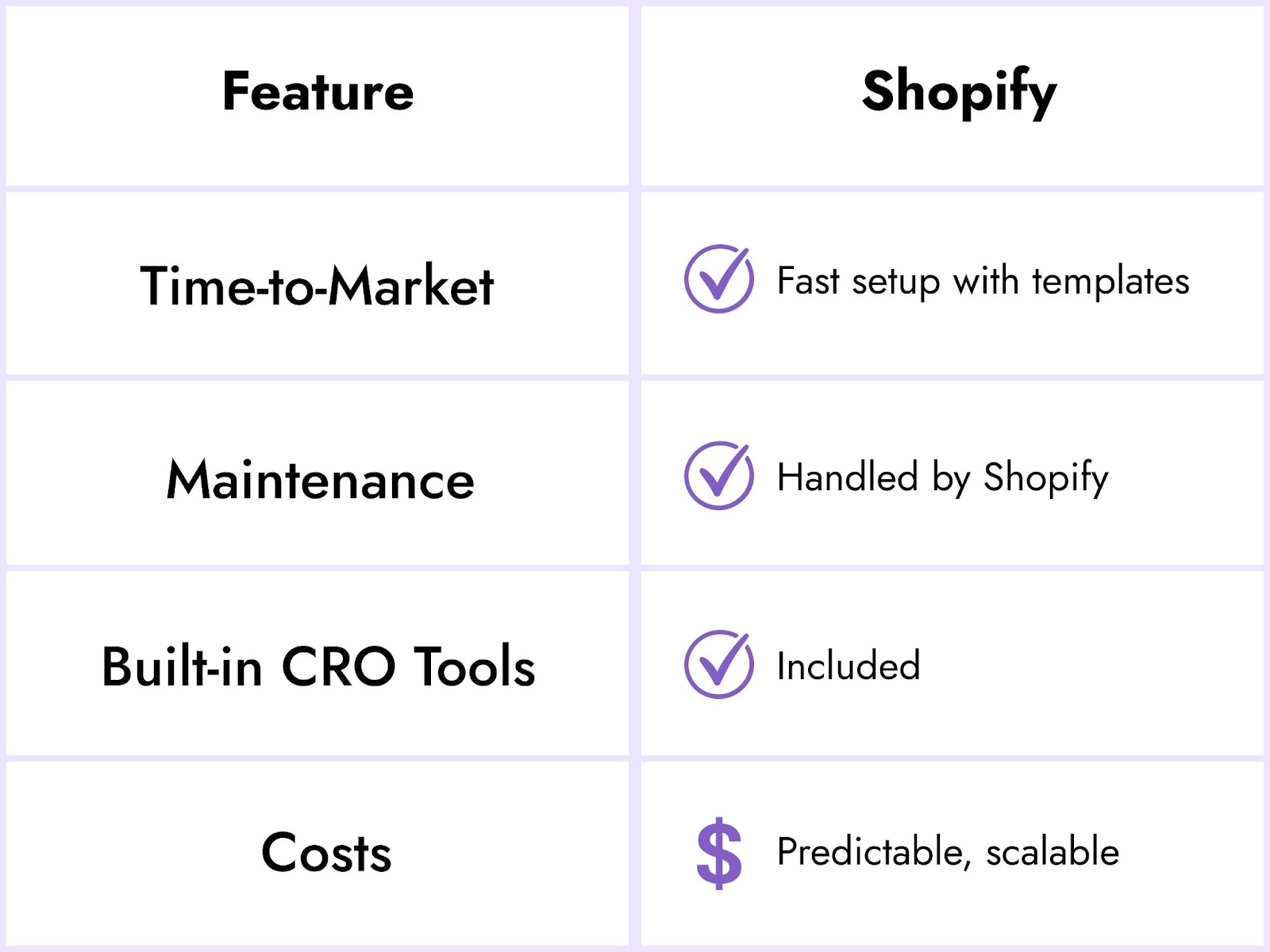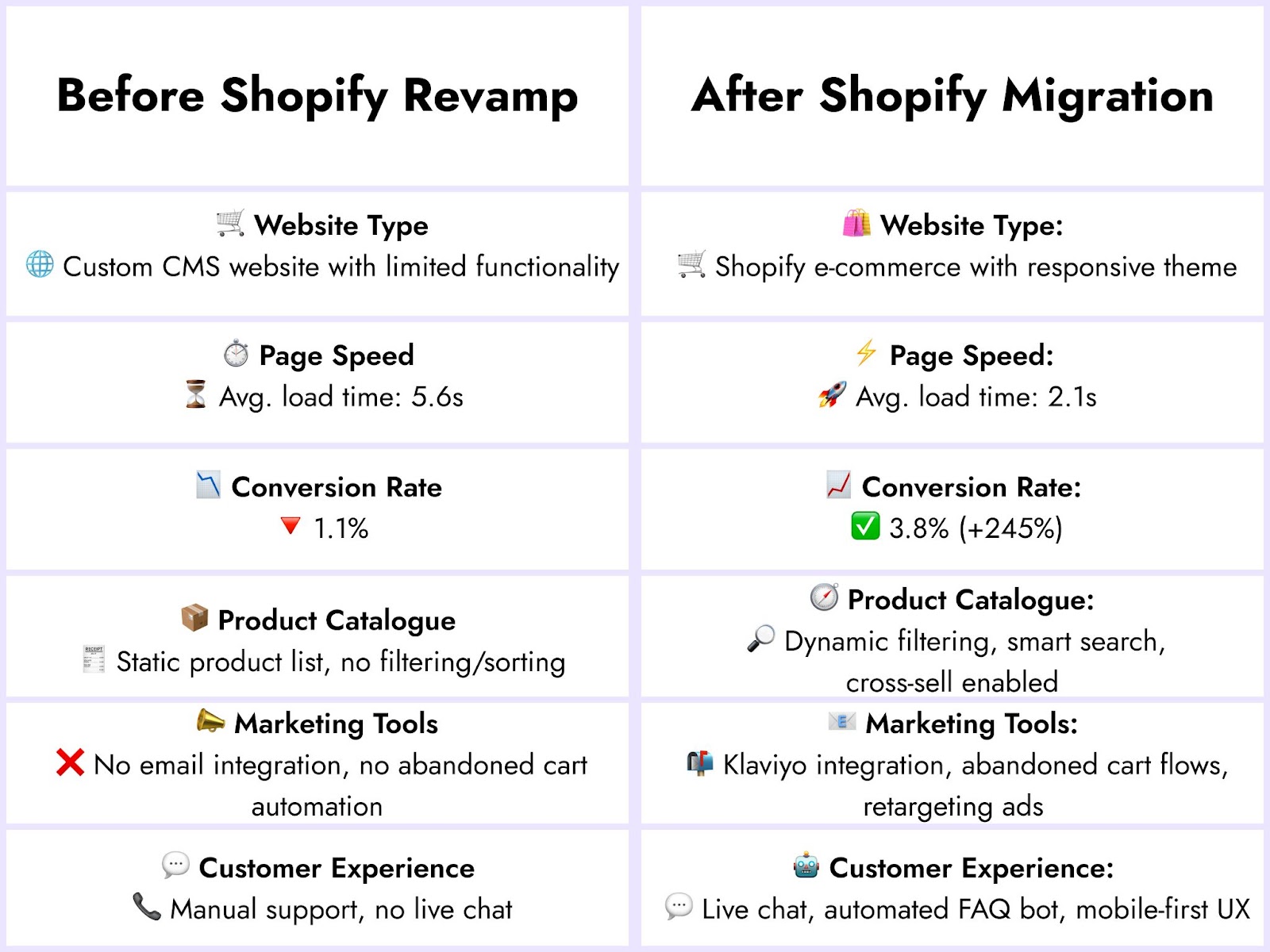The current e-commerce market demands more than just opening a Shopify store for businesses to succeed. Canadian consumers demand quick, seamless, and engaging shopping experiences that require businesses to optimize all digital touchpoints to turn browsers into buyers. Your Shopify store’s success depends on its conversion capabilities, regardless of whether you operate a niche product business or run a high-volume dropshipping operation.
This article identifies the essential features that create successful Shopify stores that convert visitors into customers.

Why Conversion Optimization Matters in Shopify Stores
A high-converting Shopify store doesn’t happen by chance. Conversion optimization involves making intentional improvements across design, functionality, and user experience to encourage visitors to take desired actions, whether that’s making a purchase, signing up for a newsletter, or completing a form.
According to industry reports, the average Shopify store conversion rate ranges between 1% and 3%. However, stores that invest in the right Shopify features and themes consistently outperform these benchmarks. Factors like load speed, design clarity, and marketing automation directly influence customer behaviour and purchase intent.
To understand how Shopify stores scale, you need to look beyond the surface level. True optimization aligns your brand’s objectives with your customers’ needs, using data-driven strategies to refine the journey from visitor to customer.

What Makes a Shopify Store High-Converting?
The analysis of design and marketing strategies requires first identifying what makes an average store different from a high-performing one. A high-converting Shopify store functions by understanding customer requirements while removing obstacles that stand in the way. The shopping experience needs to be natural, quick, and convincing, with direct buying options, suitable product suggestions, and active communication.
The implementation of Shopify functionality that scales to meet business needs is essential for success. Your business infrastructure will maintain customer experience standards through automation tools, personalization engines, and multi-channel integration capabilities when your business expands.
Features That Improve Shopify Conversion Rates
The visual and functional design of your store determines how users navigate through the store and how it affects their purchasing decisions. Let’s examine particular features that enhance Shopify conversion rates.
1. Mobile-Optimized, Responsive Design
The success of Shopify depends on responsive design because mobile devices generate more than 70% of e-commerce traffic. Your store’s layout, images, and checkout flow will adjust automatically to any screen size through mobile optimization that reduces friction and increases conversions.
2. Fast Load Speed
The speed of a website plays a vital role in maintaining user retention and search engine optimization. A one-second delay in load time can cause a substantial decrease in conversions. To achieve fast load speeds and improve Shopify conversion rates, optimize images and select performance-focused themes while removing unnecessary scripts.
3. Clear Navigation & Smart Search
A clean, intuitive navigation structure helps users find what they’re looking for with ease. Features such as mega menus, categorized collections, and predictive search improve product discoverability and drive higher engagement.
4. High-Quality Product Pages
Product pages need to be both visually appealing and informative. Include high-resolution images, 360-degree views, product videos, and persuasive descriptions. Include trust-building elements such as user reviews, secure checkout badges, and clear return policies to support decision-making.
5. Strategic Use of White Space and Visual Hierarchy
Whitespace and visual hierarchy design elements help users navigate through the page while drawing attention to calls-to-action (CTAs). The strategic application of contrast, together with layout structure, directs user attention toward product benefits and purchase prompts.
6. Trust-Building Elements
Customer reviews, together with industry certifications and transparent policies, help build buyer confidence. These features are especially critical for new or high-ticket stores, providing the credibility needed to drive conversions.
7. Email & SMS Marketing Integration
The marketing automation tools, such as Klaviyo and Omnisend, enable you to develop behaviour-based email and SMS workflows. The tools provide personalized outreach, nurture campaigns and abandoned cart recovery, which are essential to build a highly converting Shopify dropshipping store.
8. Abandoned Cart Recovery Tools
The data from the industry reveals that about 70% of shopping carts remain unattended. The Shopify features that include automated cart recovery emails, time-sensitive discount codes, and retargeting ads enable businesses to recover lost sales and boost Shopify conversion rates.
9. Upselling and Cross-selling Apps
Upselling and cross-selling strategies should be integrated to boost average order value. The implementation of tools that recommend related products and generate bundle deals during checkout has been shown to increase revenue.
10. Live Chat and Chatbots
The use of live chat tools enables businesses to resolve customer issues instantly, which decreases both hesitation and cart abandonment rates. Chatbots can automate FAQs and support ticketing, which enhances the overall Shopify functionality.
11. Multi-Channel Selling Capabilities
Your Shopify store should integrate with Instagram, Facebook, Google Shopping, and Amazon to reach more customers. Multi-channel strategies create a cohesive experience across touchpoints and improve brand trust.
12. Use of the Best Converting Shopify Themes
Choose themes that are specifically designed for conversion. The best Shopify theme for conversions is one that has a clean design, fast performance, and is compatible with CRO tools. Companies seeking performance enhancement assess the best converting Shopify themes based on their industry requirements, product types, and customer behavioural patterns. Many businesses choose Shopify development services for advanced customization and scalability needs.
Advanced Shopify Features for Business Growth
Your business needs advanced features when it expands in size. Shopify Plus users obtain access to advanced tools that include:
- Launchpad: Automates product launches and sales events
- Shopify Flow: Streamlines back-end processes with automation
- Shopify Scripts: Enables custom discounts and checkout logic
The enterprise-level features provide businesses with advanced customization options and operational efficiency that enable them to succeed in high-volume markets. Website maintenance services matter because they play an important role in maintaining these advanced integrations in the long term.

Real-Life Example: Transforming B2B Growth Through Shopify E-Commerce
A Canadian manufacturer in the home heating industry recently moved from a traditional website to a fully optimized Shopify e-commerce store. The company had previously relied on third-party retailers and distributors, with limited online presence and little direct customer engagement.
Strategic Shopify Development and Optimization
The newly developed Shopify store by us focused on solving key friction points in the customer journey:
- Improved mobile experience and responsive design
- Streamlined navigation and smart search functionality
- Optimized product pages with high-resolution visuals and clear CTAs
- Integration of live chat and simplified contact options
- Multi-channel visibility through platforms like Google and Facebook
Outcomes
The business achieved the following results after launching the store during its first few months of operation:
- Increased website traffic and time-on-site
- Notable improvements in mobile conversion rates
- Higher product inquiry volumes and order completions
- More efficient communication with end users
The transformation demonstrates how traditional B2B companies can improve their digital performance and scale their e-commerce operations through Shopify features and focused Shopify development services.
Shopify vs. Custom-Built E-Commerce Websites: Choosing the Right Platform for Business Growth
The choice of e-commerce platform determines your store’s ability to grow and perform operations efficiently. Shopify provides an integrated platform, but certain businesses might choose to develop their own complete custom e-commerce website.
The approach of using Shopify provides specific benefits that suit modern e-commerce requirements for businesses that need fast growth, scalability, and revenue maximization.
1. Speed to Launch
- Shopify: Provides pre-built templates and integrated features that enable businesses to establish stores rapidly without building everything from scratch.
- Custom Website: The launch process of a custom website involves multiple development stages followed by testing, which extends the time needed before market entry.
2. Scalability
- Shopify: The scalable infrastructure of Shopify works well for small to medium businesses and mid-sized companies through its app integrations. Shopify Plus provides enterprise-level scalability to its users.
- Custom Website: The complete control over infrastructure and architecture makes this solution perfect for highly specialized or large-scale operations with complex needs.
3. Total Cost of Ownership
- Shopify: Operates through a subscription-based system that provides cost predictability, yet app integrations and transaction fees can increase expenses.
- Custom Website: The initial development costs, along with continuous maintenance expenses for custom websites, are higher, yet they become more budget-friendly for extensive enterprises.
4. Design & User Experience
- Shopify: Provides conversion-optimized themes that customers can customize, but advanced development is required to achieve full customization.
- Custom Website: Provides businesses with complete control over user experiences and branding through dedicated design and UX expertise.
5. Maintenance & Security
- Shopify: Provides automatic hosting services, security maintenance, PCI compliance, and update management, which reduces technical work for your team.
- Custom Website: Requires businesses or their development partners to handle server management, security, and compliance responsibilities, which makes website maintenance services crucial.
6. Integration Capabilities
- Shopify: Through its App Store, Shopify enables users to connect with thousands of payment processors, CRMs, shipping providers, and marketing platforms.
- Custom Website: Provides businesses with the ability to develop deep customized integrations because many organizations need to connect with proprietary systems and specialized software stacks.
7. Flexibility and Custom Features
- Shopify: Provides excellent standardized e-commerce functionality, yet advanced customization requires Shopify Liquid and Shopify development services.
- Custom Website: The platform provides complete flexibility to create any feature or workflow, which makes it perfect for businesses operating outside traditional e-commerce models.
Your ability to choose the right e-commerce platform depends on understanding its strengths and weaknesses so you can build your foundation according to your business strategy. Shopify stands as the best choice for Canadian businesses because it delivers excellent performance and support while offering scalability when businesses use expert marketing services, CRO strategies, and post-launch website maintenance services.

Building a High-Converting Shopify Store with the Right Partner
Building a successful Shopify store requires more than selecting a well-known theme and posting basic product information. A successful Shopify store needs both user experience and backend functionality to be developed with care. The performance and customer satisfaction of a store improve through mobile responsiveness, intuitive navigation, marketing automation and trust-building design.
The selection of optimal Shopify themes, together with appropriate Shopify features, directly affects both customer engagement and sales results. Businesses that grow need to implement advanced tools and maintain consistent updates through reliable Shopify development services to achieve long-term success. The customer journey requires effective marketing services to attract qualified traffic and develop leads.
The process of creating and sustaining a Shopify store that generates conversions requires ongoing work that benefits from specific goals, data-based changes and user-centric strategies.




